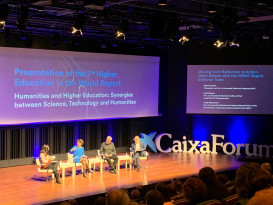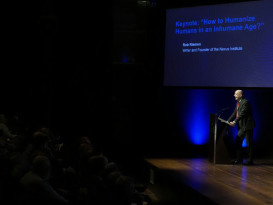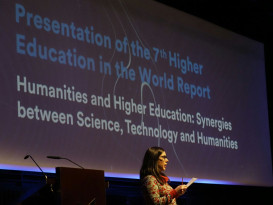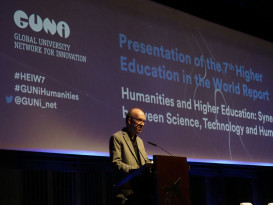GUNi presents at CaixaForum Barcelona the new World Report “Humanities and Higher Education: Synergies between Science, Technology and Humanities”
Today’s societies are undergoing profound changes with clear consequences for the future. These environmental, scientific, technological, cultural and social transformations present momentous challenges in thinking and reflecting on the meaning and value of the human experience. These challenges can only be addressed through a holistic approach that brings together the humanities, science and technology, With contributions from 130 authors from around the world, the 7th World Higher Education in the World Report (HEIW7) Humanities and Higher Education: Synergies between Science, Technology and Humanities has been presented at an event open to the public on 10 December 2019 in the auditorium of CaixaForum Barcelona. The report, promoted with the support of La Caixa, University and Research Secretary and Foreign Action, Institutional Relations and Transparency Department, makes a diagnosis and current analysis of the state of the humanities and offers proposals that can broaden our horizons towards a comprehensive approach to knowledge.
The World Report (HEIW) is a collective project that takes into account the main problems and challenges of higher education and its institutions. With the contribution of 130 experts around the world, GUNi is dedicating the 7th edition of the World Repot Humanities and Higher Education: Synergies between Science, Technology and Humanities to facilitate synergies between science, technology and humanities for the academic community politicians and all those who work in the field of education in order to offer proposals for the future in the field of humanities and in the multidisciplinary work of the various branches of knowledge.
The report aims to explore the relationship between the humanities, science and technology in different societies around the world and shows examples of synergies in different education systems. It explores how the humanities could address the major transformations around science and technology and their ethical challenges. It also addresses the different roles that higher education should have as a social agent and explores the possible relationships between the university and society.
The report also addresses the mapping and understanding of global challenges in ordre to establish a new paradigm in the relationship between science, technology and the humanities. It aims to identify the key competences to be developed in the face of current social and economic changes, and to explore new teaching methodologies and the concept of lifelong learning. Among other aspects, it also aims to explore gender equality in terms of access to education, academic careers and choice of studies, and to analyse gender in science, technology and the humanities in terms of ideological paradigms and exploration in order to incorporate the gender approach in all disciplines beyond gender-specific studies.
To achieve this, the report is structured into nine themes that seek to encompass different approaches: epistemological, social, cultural, political, educational, environmental and institutional. Each theme includes questions on major issues that different authors have used as a basis for their contributions, always striving to adopt a reflection and propositional approach with case studies and examples of institutions, programmes, research studies and projects that work in an innovative and transdisciplinary way. The Report also includes two essential chapters: one dedicated to the achievement of the Sustainable Development Goals (SDGs) and the other devoted to the regional perspective from Latin America and the Caribbean. It also includes special contributions from the Union for Mediterranean and La Caixa.
The event was welcomed by Joan Elias, president of the ACUP and GUNi and rector of the UB; Àngel Font, corporate director of research and strategy of La Caixa; and Francesc Pedró, director of IESALC-UNESCO. Rob Riemen, writer and founder of the Nexus Institute, followed the programme of the event, emphasizing the need to reflect on the nature of humanity in his talk “How to Humanize Humans in an Inhuman Age?” and then Josep M. Vilalta, director of GUNi and executive secretary of the ACUP, presented the HEIW7 Report. Subsequently, the Report’s editorial team participated in the debate session “From reflexion to action” facilitated by Irene Lapuente, from La Mandarina de Newton. The closing words were given by Francesc Xavier Grau, secretary of Universities and Research; José Manuel Pingarrón, general secretary of Universities; and Alfonso González Bondia, general director of European and Mediterranean Affairs.
The HEIW7 Editorial Committee and International Advisory Board
The Report’s Editorial Committee is made up of professors Marina Garcés, David Bueno and Josep Casanovas. The Report has also had an International Advisory Board, made up of Rosi Braidotti, Gemma Derrick, Axel Didriksson, Arne Jarrick, Peter Okebukola and Alireza Omidbakhsh.
About Global University Network for innovation (GUNi)
The Global University Network for innovation is an international network created in 1999 in the context of the UNITWIN/UNESCO Chairs Programme by UNESCO, the United Nations University (UNU) ant the Polytechnic University of Catalonia (UPC) after the 1998 UNESCO World Conference on Higher Education (WCHE) to provide continuity and facilitate the implementation of the main decisions taken during this conference. The Catalan Association of Public Universities has its secretariat and presidency. GUNi is a network of 227 members from eighty different countries, including UNESCO Chairs in Higher Education, higher education institutions, research centres and networks related to innovation and social commitment. GUNi has regional offices in Latin America, the Caribbean and sub-Saharan Africa. Since its creation, GUNi’s mission has been to strengthen the role of higher education in society by contributing to the renewal of visions and policies around the world under a vision of public service, relevance and social responsibility.



